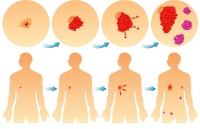Benefits Of Micronutrients In Sarcomas Affecting Adults
Sarcoma is a cancerous growth developing in the cells of the connective tissue. Primary cancers that develop in the soft connective tissues such as in the muscles, nerves, blood vessels, and fat cells, are called soft tissue sarcomas, versus osseous sarcomas, which develop in hard connective tissue such as in the bones and cartilage. Connective tissue is abundantly present everywhere in the body, and therefore soft tissue sarcomas can occur anywhere. However, the most common locations for soft tissue sarcomas are in the arms and legs, followed by the organs in the abdominal cavity. While it is a rare type of cancer and constitutes about 1% of all adult cancers, the American Cancer Society estimates that in 2015, approximately 12,000 adults will be newly diagnosed with soft tissue sarcoma, and 4,870 adults may die due to this disease.
Although there are more than 50 types of sarcomas, the more common adult sarcomas are liposarcoma (originating from the fat cells), fibrosarcoma (originating from fibroblasts which are the cells that make the collagen meshwork), chondrosarcoma (originating from the cartilage), and leiomyosarcoma (originating from the muscle cells). Fibrosarcoma and liposarcoma are the most common types of sarcomas in adults and are most commonly treated with surgery followed by chemotherapy and/or radiation. However even with such aggressive approaches, almost half of the sarcomas in adults are resistant to the treatments and they spread to other organs. After the cancer starts spreading (metastasis), only 50% of the sarcoma patients may live beyond 5 years.
The spread of cancer depends on the ability of cancer cells to destroy the surrounding connective tissue with the help of matrix metalloproteinase enzymes (MMPs). The action of MMPs depends on the presence of the amino acid Lysine, and specific proteins and hormones secreted by the surrounding connective tissue cells. Substances such as tumor necrosis factor (TNF-alfa), epidermal growth factor (EGF), and other cytokines control the activity of MMP enzymes secreted by the cancer cells. Therefore, we investigated the effects of micronutrients on various natural compounds that affect MMP enzymes in different types of sarcoma cells commonly affecting adults1. In all the cell lines we studied, the micronutrient combination containing vitamin C, lysine, proline, and green tea extract, and others, inhibited the MMP secretion. We also compared the effects of green tea extract with doxycycline on MMP inhibition. Both of these substances equally inhibited MMP secretion in all sarcoma cell lines but, contrary to doxycycline, the green tea extract was not toxic to the cells.
In a separate study, we examined the effects of a micronutrient combination on a different type of enzymes (urokinase plasminogen activators or u-PA) which are also involved in metastasis2. In this study, the micronutrients inhibited secretion of both u-PA and the MMPs, and increased secretion of MMP inhibitors (TIMP-2) in fibrosarcoma, chondrosarcoma, liposarcoma, and uterine leiomyosarcoma cells.
The increased levels of MMPs and u-PA enzymes are associated with tumor growth, cancer progression, and metastasis, all of which reduce overall survival of sarcoma patients. Optimum amounts of synergistic micronutrients help in maintaining the strength and stability of the connective tissue. Our results show that the micronutrients reduce the secretion of MMP and u-PA enzymes in all sarcoma cell lines without any adverse effects, suggesting their possible use in patient management.
- M.W. Roomi, et al., In vitro modulation of MMP-2 and MMP-9 in adult human sarcoma cell lines by cytokines, inducers, and inhibitors, International Journal of Oncology 43: 1787-1798, 2013
- M.W. Roomi, et al., Modulation of u-PA, MMPs and their inhibitors by a novel nutrient mixture in adult human sarcoma cell lines, International Journal of Oncology 43: 39-49, 2013
